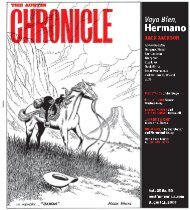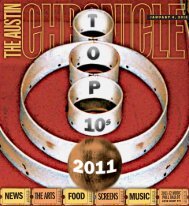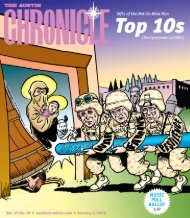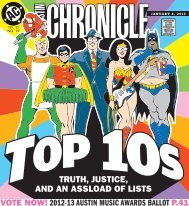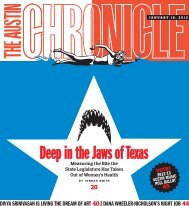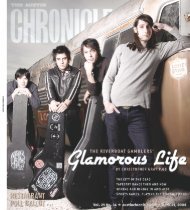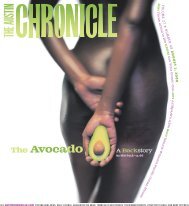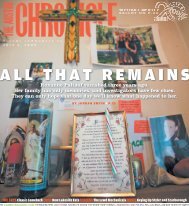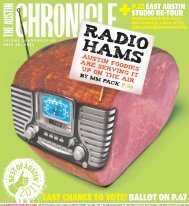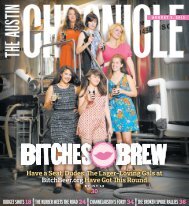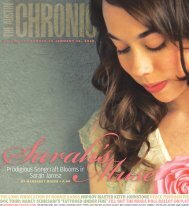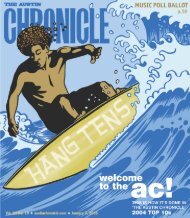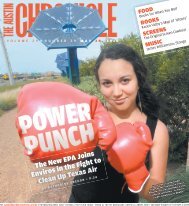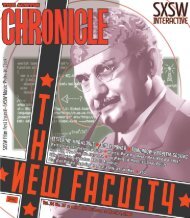R E S T A U R A N T P O L L B A L L O T P . 4 6 - The Austin Chronicle
R E S T A U R A N T P O L L B A L L O T P . 4 6 - The Austin Chronicle
R E S T A U R A N T P O L L B A L L O T P . 4 6 - The Austin Chronicle
- No tags were found...
You also want an ePaper? Increase the reach of your titles
YUMPU automatically turns print PDFs into web optimized ePapers that Google loves.
THE ARTSBOOKSBut Is It Art?<strong>Austin</strong> Kleon gets creative with poetry in his newcollection, ‘Newspaper Blackout’BY KIMBERLEY JONESWriter’s block can make a man murderous. <strong>Austin</strong> Kleon’s chosen weapon? A Sharpie. A fewyears back, while living in Cleveland, Kleon decided to vent his frustrations with writing by pickingup a copy of <strong>The</strong> New York Times and slashing and burning with a marker. <strong>The</strong> remaining words,peeking out from a wash of black, had the look of a redacted document, but they read like a poem.“I didn’t know what I was doing, or why,” Kleon writes in the introduction to his new collection,called Newspaper Blackout (Harper Perennial). “All I knew was that it was fun to watch those wordsdisappear behind that fat black marker line. It didn’t feel like work; it felt like play.”That sense of play infuses the poems – short pieces that touch on first sex and outer space, ina voice that slips from funny to elegiac to freshman-year philosophic – but Kleon’s creative spiritdoesn’t stop there. Now an <strong>Austin</strong> resident, Kleon is a Web designer by day; he’s also a talentedcartoonist (check out his work at www.austinkleon.com) and prolific blogger. It seems he’s always inthe act of creating – even if he’s not sure just what it is he’s creating, or why. <strong>The</strong> <strong>Chronicle</strong> recentlyspoke to Kleon by phone in advance of his book launch party at BookPeople on April 13.<strong>The</strong> <strong>Austin</strong> <strong>Chronicle</strong>: I’m curious about theprocess itself. You don’t read the original articlesbefore you start blacking out words, right?<strong>Austin</strong> Kleon: I do my best not to read them.I don’t think “reading” would be a good word.I would say “scanning.” I’m really trying mybest to treat this newspaper as a blank canvas.Well, not necessarily a blank canvas – I like tosay it’s like one of those old word search puzzlesthat they used to have in activity booksfor kids, where you’d have a big field of lettersand you’re supposed to select the wordsthat you’re looking for onthere. That’s the metaphorI like to use for it. I like tolook at it like there are allthese words on this page,and I’m just looking for theones that appeal to me.AC: So you don’t have atheme in mind?AK: Oh, never. Never havea theme in mind. <strong>The</strong>re’susually some anchor wordin there or some phrase,or a combo of two words,and that’s really when thepoem starts. Until I havethat anchor word, there isno poem, you know?AC: You’ve referred to theprocess as “subtraction,” butyou could just as reasonablycall it “destruction,” right? Which is particularlypoetic for anyone suffering from writer’s block.AK: Sure. Yeah, I think we all have destructivestreaks in us. … Someone brought up graffitirecently, and I said yeah, there’s definitely anelement of that, an element of the forbiddento it. Because it’s something that like, if youwere 5, and you picked up a marker andstarted scribbling on your parents’ New YorkTimes, you’d probably get scolded for it.AC: Do you exclusively use <strong>The</strong> NewYork Times?AK: I do, yeah. That’s more a matter of I’vebeen reading it for so many years, and I’vealways had a subscription, so there’s alwaysbeen a big pile of it. But more than that, theTimes has really nice typography. <strong>The</strong> layoutis always pretty great. And most of all, thereare a lot of words in it. Which sounds reallysimplistic, but it’s hard to find papers nowadaysthat have a lot of words in them that aregood words.AC: That is a sad statement on what’s going on.AK: Yeah. [laughs]AC: That’s interesting that something like thetypeface attracts you. Does your design backgroundinform how the poemlooks on the page?AK: Oh, absolutely. I payvery close attention to thelayout of the words andhow it reads. I’m a real bigstickler on [wanting] tomake sure it’s easy to follow,the trail of the words,you know? So a lot oftimes that will influencethe kind of poem I make.… It’s not just pure writing;it’s design, too.AC: It’s funny you say“poem I make” as opposed“poem I write.”AK: We have this idea thatwriting comes out of yourfingers on a keyboard,that that’s the main wayto write or whatever, but my whole idea is tobring writing back to using your hands, tousing materials. Because in my life, the moreI’ve used my hands as part of my writingprocess, the better my writing got, whetherit was using a Sharpie with a newspaper orwriting my words down on index cards andreshuffling them, cutups using scissors andglue, you know. And that’s something thatthe more the computer is taking over ourwriting process, we lose that kind of tangibleaspect to making things. And that’s why Ilike the poems so much – you feel like you’remaking something.AC: You’re someone who has incorporated creativityinto all aspects of your life – in your 9-to-5work, in your drawings, in your blog, your poems.And then you end your book with a “how to” section.It seems like you really want to demystify theartistic process.AK: I take so much inspiration from artists whoare very transparent about their process, thatshow you: ‘Look, I made this stuff. Here is howit happened.’ Art isn’t something you pull outof thin air. I mean, there’s always the somewhatmystical element to the creative process. I don’tknow where any of my ideas are from; all I cantell you is the process I use to let those ideascome. My idea of a perfect world would bewhere everyone makes their own art, where theywouldn’t need me. [laughs] Everyone would bemaking great stuff all the time. I might be out ofa job, but it’d be a pretty great place.<strong>The</strong> big influence on my thinking aboutthat is a woman named Lynda Barry who’s acartoonist. I met her when I was still living inCleveland, probably not too long after I startedmaking the poems. She was so wonderfullyopen about her technique and how she writes.… <strong>The</strong> structure of [Newspaper Blackout] isactually based on one of her books called One!Hundred! Demons!, where she used a Chinesebrush to make all of her comics. She startedout the book saying, “This is how I discoveredthe Chinese brush,” and then the rest of thebook was her actual comics, and then at theend there was a “how to” section. … And Ithought that was such a beautiful format, so Isaid, “Oh, I’m gonna totally rip that off.”AC: In your introduction, you include the namesof other artists and writers who have done similarexperiments with form and process, although youadmit you didn’t know about them when you firststarted the blackout poems.AK: I’m really being honest in the introduction– when I first started, I knew about cutups, butI was really thinking about redacted governmentdocuments. [laughs] I thought I was ripping offthe government. But what’s fun about beingonline and about blogging is that you get educatedby all your readers and all the people whocome across your stuff. So I’d have people leaveme comments like, “Oh, dude, this is totally likeTom Phillips” or “This is like Ronald Johnson– you should check this out,” and I startedamassing [information about] all these greatpeople who’d come before. It was in some waysa defensive move on my part, because I didn’twant people to think, “Oh, this kid thinks he’sinvented this.” I wanted something to say, “No,I’m not the only person who’s ever done this;here’s the background, go check these peopleout.” I [included] a reading list. And hopefullyall those people will sell more books.I think a lot of artists consider themselves tobe magicians – they’re like, “Oh, well, if I giveaway all my secrets, no one will come see me.”Whereas I’ve found with artists, the moreopen they are about their processes, the moreinteresting I find them and the more I want tofollow their work. So that’s the approach I’vetaken with my fans and my followers, is just tolet them in on the process as much as I can.AC: What’s the book launch at BookPeople goingto be like?AK: I’m really against reading the poems. Ireally don’t think they need to be read aloudby me – I think people need to see them. I’mplanning on doing like a little slide show, justkind of a quick, five-, 10-minute slide showabout how I got started, and then I’m reallyhoping we can all make our own poems. I’mhoping that’ll be a real interactive element.And I’ll have Sharpies and papers and stuff sowe can all just play and make stuff.AC: So you’re a Sharpie man?AK: [laughs] I … I am hesitant to claim anykind of corporate attachment. I have usedSharpies. I have used Marks-a-Lot. I use whatever’son sale.AC: So you’re not fishing for any endorsements.AK: I would not mind an endorsement. I amnot endorsed now.AC: You’re still a free agent.AK: Yes, still a free agent.<strong>Austin</strong> Kleon will appear at BookPeople (603 N. Lamar)on Tuesday, April 13, 7pm.34 T H E A U S T I N C H R O N I C L E APRIL 9, 2010 a u s t i n c h r o n i c l e . c o m



